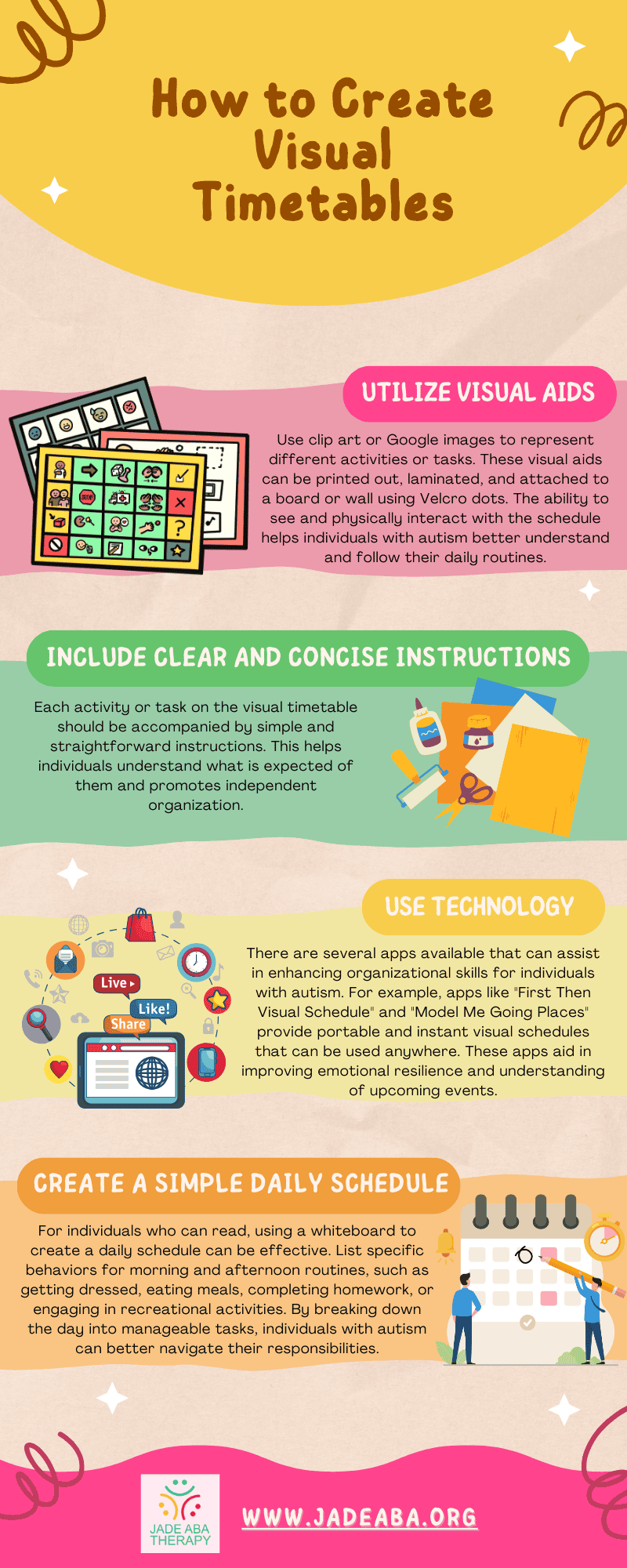Individuals with autism may experience difficulties in executive functioning skills, which can affect their ability to organize and manage tasks effectively. Some common challenges include trouble with flexibility, initiating activities, working memory, and thought flexibility.
Cognitive flexibility, in particular, is often a standout problem for individuals with autism, and it may persist as they get older.
Executive functioning skills are crucial for managing daily responsibilities, such as completing tasks, following routines, and staying organized. Difficulties in these areas can lead to feelings of frustration and can make it challenging for individuals with autism to navigate various aspects of their lives.
In this article, we’re going to explore effective techniques and strategies for improving the organizational skills of individuals with autism.

Strategies for Improving Organizational Skills
Several strategies can be implemented to improve the organizational skills of individuals with autism. These strategies aim to address executive functioning challenges and enhance daily life.
Let’s look at each of them.
One-on-One Counseling
Providing one-on-one counseling can be highly beneficial for individuals and couples affected by Autism Spectrum Disorder (ASD).
This personalized approach allows for tailored guidance and support in improving organizational skills. A trained counselor or therapist can work closely with the individual to identify specific areas of difficulty and develop strategies to overcome them.
In one-on-one counseling sessions, the focus is on understanding the unique challenges faced by individuals with autism and providing practical techniques to enhance organizational skills. This may include developing structured routines, implementing visual supports, and utilizing assistive technology.
By addressing executive functioning challenges through counseling, individuals can gain valuable tools and strategies to manage their daily tasks and responsibilities better.
Online Group Therapy
Online group therapy offers a supportive and interactive environment for couples affected by Autism Spectrum Disorder. These therapy sessions focus on improving organizational skills within relationships and help couples navigate the challenges that may arise due to executive functioning difficulties.
Through online group therapy, individuals can connect with others who understand their experiences. Therapists facilitate discussions, provide guidance, and offer practical strategies for enhancing organizational skills.
This collaborative approach allows participants to learn from one another, share insights, and support each other in their journey towards improved organization.
Educational Resources
Educational resources play a crucial role in improving organizational skills for individuals with autism. These resources can include eBooks, audio instructions, masterclasses, and other materials specifically designed to provide educational support for neurodiverse individuals and couples.
One valuable resource is the book “Smart but Scattered Teens: The Executive Skills Program” by Richard Guare, Peg Dawson, and Colin Guare. This comprehensive guide promotes independence in teens by enhancing their executive skills, including organization, planning, and emotional control.
By utilizing educational resources, individuals and their families can gain valuable insights and tools to support the development of strong organizational abilities.
Implementing the above strategies can help individuals with autism enhance their organizational skills and improve their overall well-being. These approaches provide valuable support, guidance, and practical techniques to navigate the challenges associated with executive functioning difficulties.

Support for Teens with Autism
Teens with autism often face challenges in developing and maintaining organizational skills. Cognitive skills development and utilizing available resources can significantly support them in improving their organizational skills.
Cognitive Skills Development
Teens with autism may experience difficulties in executive functioning skills such as organization, flexibility, initiating activities, and working memory. Cognitive flexibility, in particular, can be a persistent challenge as they grow older.
Individualized counseling or therapy sessions can be beneficial for teens with autism to target specific cognitive skills and improve their organizational abilities. These sessions can provide personalized strategies tailored to their unique needs.
Utilizing Available Resources
Utilizing available resources is another important aspect of supporting teens with autism in improving their organizational skills. Parents, caregivers, and educators should explore various resources that can aid in the development of organizational abilities.
Educational resources designed for individuals with autism can provide valuable insights and strategies for enhancing organizational skills. These resources may include books, online articles, and videos that offer practical tips and techniques.
Collaborating with professionals, such as psychologists, educators, and occupational therapists, can also be beneficial. They can provide guidance, support, and evidence-based interventions to help teens with autism develop and strengthen their organizational skills.
Keep in mind that improving organizational skills for teens with autism requires patience, understanding, and time. Each individual may have unique needs and may require different strategies.

Practical Tips for Autism Organization
When it comes to improving organizational skills for individuals with autism, there are practical strategies that can make a significant difference in daily life. These strategies are as follows:
Minimize Sensory Overload
Sensory overload can be a common challenge for individuals with autism and can significantly impact their organizational management. By minimizing sensory overload, it becomes easier for individuals to stay focused, engaged, and organized.
Here are some practical tips to achieve this:
- Create a sensory-friendly environment – Designate a quiet and calm space where individuals can retreat when they feel overwhelmed. This space should be free from excessive noise, bright lights, and other sensory stimuli that may cause distress.
- Use sensory tools – Provide sensory tools such as fidget toys, weighted blankets, or noise-canceling headphones. These tools can help individuals regulate their sensory input and maintain a sense of calm. Experiment with different tools to find what works best for each individual. You can also add in some sensory exercises as well.
Create Visual Timetables
Creating a visual timetable is a valuable technique for individuals with autism. Visual timetables make it easy to predict when activities will take place, providing a sense of structure and organization.
Here’s how you can achieve it:

Implementing these practical tips can help individuals with autism improve their organizational skills and enhance their ability to manage daily tasks. By minimizing sensory overload and utilizing visual timetables, individuals can experience increased independence and a greater sense of control over their environment.
Tools and Techniques for Organization
Using tools and techniques can also be immensely helpful for improving organizational skills in individuals with autism. These resources provide structure and visual support as well as independence.
Helpful Apps
Technology has opened up a world of possibilities when it comes to supporting individuals with autism in their organizational skills. Several helpful apps can assist in creating routines, managing tasks, and enhancing overall organization.
Some popular apps include:
- First Then Visual Schedule – This app provides a portable and instant visual schedule that can be used wherever you are. It allows you to create personalized schedules with pictures and text, helping individuals with autism understand and anticipate upcoming events.
- Model Me Going Places – Designed to enhance a child’s emotional resilience and understanding of upcoming events, this app utilizes visual modeling to assist individuals in knowing what to expect next. It can be particularly beneficial in unfamiliar or overwhelming situations.
These apps serve as valuable tools to support individuals with autism in navigating their daily routines and tasks. They provide a visual representation of activities, which aids in reducing anxiety and increasing independence.

Visual Schedules
Creating visual schedules is a widely used technique for individuals with autism. Visual schedules make it easy to predict when activities will take place, providing a clear structure and reducing uncertainty. This visual approach is particularly beneficial for young children and those with special needs like autism, Down Syndrome, and other developmental delays.
To create a visual schedule, you can use clip art or Google images to represent various activities. These images can be laminated and utilized with Velcro dots, allowing for easy organization and flexibility.
By arranging the images sequentially, individuals with autism can easily understand what activities they need to complete and the order in which they should be done.
In addition to using specific apps, a simple whiteboard can also be used to create a visual schedule. This method is particularly effective for children who can read. By listing specific behaviors and tasks in a morning or afternoon routine, children with autism can better manage their day. This visual representation helps them navigate tasks effectively and provides a sense of structure and predictability.
Using helpful apps, visual schedules, and various strategies can help autistic individuals enhance their organizational skills and improve their overall daily functioning. These are all designed to provide support, promote independence, and contribute to a structured and predictable environment that benefits individuals with autism.
For families seeking professional support, ABA therapy in Maryland offers tailored strategies that can enhance coping skills and foster personal growth. To learn more about how Jade ABA Therapy can help, feel free to contact us today and explore the best solutions for your loved one.
Sources:
https://learningforapurpose.com/how-to-help-teens-with-autism-with-organization-skills
https://www.myaspergerschild.com/2021/12/how-to-teach-organizational-skills-to.html
https://kids-first.com.au/how-to-help-kids-with-autism-get-organised
https://overcomewithus.com/autism/5-ways-to-improve-the-organizational-management-of-autistic-people




